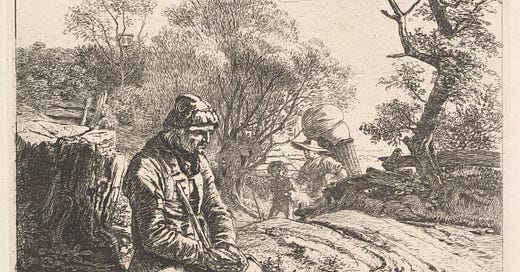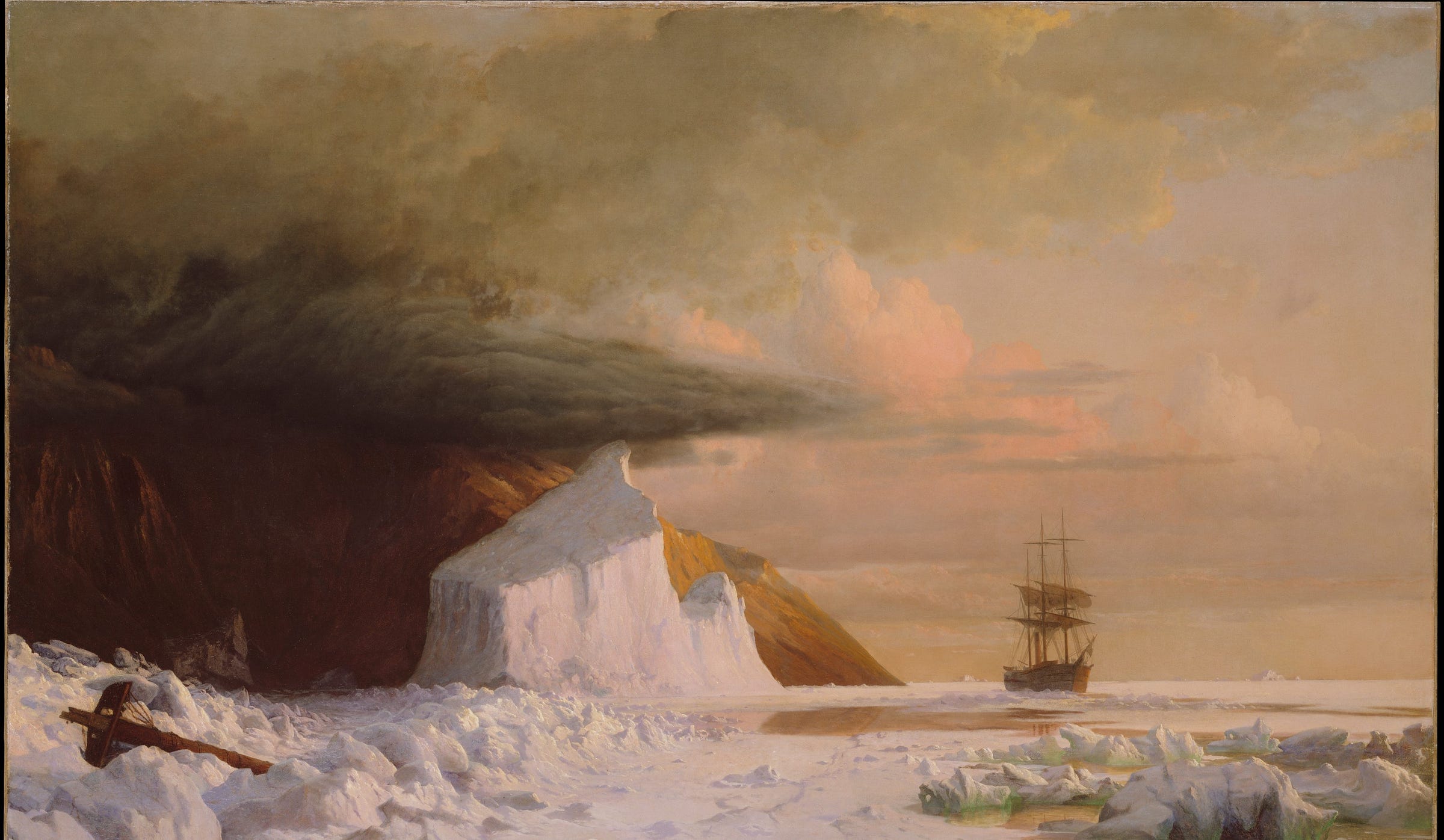A longer post today, as I first share an original, and then practice (what are very rusty) lit analysis skills on a poetic classic by Emily Dickinson, on the same theme.
The Envelope There’s been an Envelope down by the front door I’ve just noticed; but it’s gathered dust Crumpled – (maybe I did see it before) In my hand now, I already know what it must contain Pages to read and learn and weep in foggy remembrance and regret over ignorance of what the fullness of real Feeling could have been like during moments long gone. The archaeologist pores over ancient cave-damp scrolls comparing spellings of transcendent words and wishing if only they were there– there when It was written. And I Was. The Envelope holds blank pages too calling me forth to a new Age Of Exploration on tall ships with grand names: The Resolution, His Fortitude, Indefatigable, Perseverance They shall carry me on through the snow as new frontiers beckon, promising not happiness, but Feeling. -N.C-J, 2025
This is a departure in style from what I usually like: metrical, form poetry. So I’m not sure what to think about it, but there are some pleasant turns of phrase. Let me know if it’s good or bad. Despite dubious quality it is an attempt to describe my own exploration of moving past the Hour of Lead. In some way I have inhabited this Hour for many years - farther back than the passing on of my mother, and for far less compelling reasons. Wanting to be brave enough to let things thaw and look at what the melt leaves behind. An envelope I feel needs opening.
I think there is still a place for allowing oneself to emotionally exist in Hour of Lead, for a time. But now I am hoping to move through this stage, on to an unfolding. Opening the mucky, wet, sealed envelope and smoothing out the paper inside to discover and create. This poem — and the previous two blog entries — are a distillation of why I’m publishing this blog and writing at all. To rediscover magic and sincerity, and become emotionally honest and articulate. From this point my posts will be less about talking about what I’m trying to do and more just doing it.
How striking is that? Also, short enough to read twice, so give it another go. I won’t claim to the one ‘correct’ reading of Emily Dickinson’s poem, but to me the whole thing is a wonderful elaboration on her first line; what it feels like to experience great emotional tragedy. It is a poem that keeps repeating, or building the same concept with wonderfully evocative metaphor. Each one had me saying ‘yes - that’s exactly how it feels!’. Sometimes great pain can be hot or acute, but Dickinson’s choices of “sit ceremonious like Tombs” “Feet mechanical” “Wooden Way” “Quartz contentment” “Freezing persons” each build and reinforce a spreading, ubiquitous chilly numbness.
The line that seems most out of place, to me, is the second couplet. My reaction is that she refers here to Christ. Perhaps Emily questions the pain Jesus took upon Himself; was it a comfort for her that He knew he distress? That he had friends die, felt abandonment? Or is she employing an accusatory tone, asking “when really did this all happen… maybe never for all the good it’s done me.” From brief research on her life, Emily had an on-again-off-again relationship with the Lord (not uncommon), so I’m not sure at which point in her story this poem 372 comes along. But she certainly was familiar with the Christian story - what do you think? Is there a different reading of this couplet?
The other part of the poem that could perhaps change the mood of the whole piece is the very last phrase. It’s a beautiful ambiguous ending to me. Detailing the “Hour of Lead”, she describes it as time that is never truly forgotten, regularly thought of and perhaps dwelt on in silent reflection though the moment is long past. The way a freezing person recollects the snow. So deep one forgets they are cold, as lethargy sets in, they let go. My initial take is that the letting go means to let go of life. To stop holding on to warmth and light, succumb to wicked cold and freeze to death in the waste. Literal? The death of emotional potential and the possibility of happiness? The bliss of the heavy yoke slipping off and finally letting go of trying so hard not to be numb anymore. The resignation of a person too sad to continue trying to be happy. Better to feel nothing then to live in the great pain.
A more positive reading of the end is that the letting go is the release of the grief event as the eternal dictating moment of ones life. Letting go of the idea that I can only now be sad, but that instead (please) taking up the banner that there is potential of a brighter future. Perhaps the nerves stand up, and push blood back into their legs and stretch the soreness and pain away. The Feet as well shake the dust off, having become flesh once again. It is, after all, only an Hour of Lead. Not a Lifetime.
Regardless of the ‘true’ meaning, or perhaps regardless of what Emily felt as she composed this piece, it is truly a masterful description of that time after great pain which all who have lost dear ones will know. That for some moments, long or short, there is the lockdown, anesthetic freezing of emotions.
Thanks for stopping by. See you next week!







I like your closing, especially: "They shall carry me on through the snow / as new frontiers beckon, ... "
It reminds me of the last Calvin & Hobbes cartoon, likening freshly fallen snow as a black sheet of paper to draw on. Nice one, Nick! I'd say keep experimenting and trying out different approaches.
What a wonderful choice of Dickens poem, and your own reflection on the Hour of Lead is moving. My favorite line in yours is the parentheses. It surprised me, yet felt so authentic.
So glad to find you here on Substack!